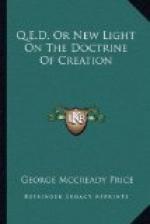It may not be out of place to quote here from one of the classics dealing with this subject,—words that are just as true to-day as when first written nearly half a century ago:
“Let us place vividly in our imagination the picture of the two great kingdoms of nature,—the inorganic and the organic,—as these now stand in the light of the Law of Biogenesis. What essentially is involved in saying that there is no spontaneous generation of life? It is meant that the passage from the mineral world to the plant or animal world is hermetically sealed on the mineral side. This inorganic world is staked off from the living world by barriers that have never yet been crossed from within. No change of substance, no modification of environment, no chemistry, no electricity, nor any form of energy, nor any evolution, can endow a single atom of the mineral world with the attribute of life. Only by the bending down into this dead world of some living form can these dead atoms be gifted with the properties of vitality; without this preliminary contact with life they remain fixed in the inorganic sphere forever.
“It is a very mysterious law which guards in this way the portals of the living world. And if there is one thing in nature more worth pondering for its strangeness, it is the spectacle of this vast helpless world of the dead cut off from the living by the Law of Biogenesis, and denied forever the possibility of resurrection within itself. The physical laws may explain the inorganic world; the biological laws may account for the development of the organic. But of the point where they meet,—of that strange border-land between the dead and the living,—science is silent. It is as if God had placed everything in earth and heaven in the hands of nature, but had reserved a point at the genesis of life for His direct appearing."[6]
[Footnote 6: Henry Drummond, “Natural Law in the Spiritual World,” Chapter I.]
It would be superfluous to emphasize further this great outstanding fact that the not-living cannot become the living by any of the processes which we call natural; and it would be presumptuous to attempt to emulate these eloquent words by seeking to emphasize the completeness with which this great Law of Biogenesis confirms the truth of a real Creation; for the supreme grandeur and importance of this law could be only obscured by so doing.
II
Perhaps some of the most impressive lessons on this subject will be found in connection with the history of the discovery of this great Law of Biogenesis, which says that life can come only from life. For by studying the history of the way in which this great Law has been established, we cannot fail to be impressed with the thought that back of all the complex array of living forms in our modern world which go on perpetuating themselves in orderly ways according to natural law, they could have originated only by a direct and real Creation, essentially and radically different from any processes now going on.




